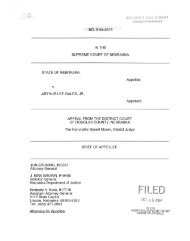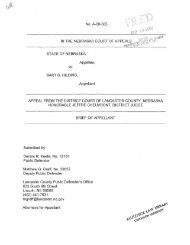Financial Articulation of a Fiduciary Duty to Bondholders with ...
Financial Articulation of a Fiduciary Duty to Bondholders with ...
Financial Articulation of a Fiduciary Duty to Bondholders with ...
Create successful ePaper yourself
Turn your PDF publications into a flip-book with our unique Google optimized e-Paper software.
1986]<br />
FIDUCIARY DUTY TO BONDHOLDERS<br />
have first and residual claims respectively on the corporation's assets<br />
and cash flow, 169 they are correspondingly the first and residual equitable<br />
owners <strong>of</strong> the corporation's assets and cash flow. Because corporate<br />
<strong>of</strong>ficers and direc<strong>to</strong>rs owe fiduciary duties <strong>to</strong> the equitable<br />
owners <strong>of</strong> the corporation's assets 1 70 and because, in general, bondholders<br />
are the first equitable owners <strong>of</strong> the corporation's assets<br />
under the Black-Scholes conception <strong>of</strong> the corporation, 171 corporate<br />
<strong>of</strong>ficers and direc<strong>to</strong>rs owe fiduciary duties <strong>to</strong> bondholders which correspond<br />
<strong>to</strong> those owed <strong>to</strong> s<strong>to</strong>ckholders. Given the foundation <strong>of</strong> a<br />
bondholder-management fiduciary relation which proceeds from the<br />
rule <strong>of</strong> corporate current-market-value maximization and the Black-<br />
Scholes conception <strong>of</strong> the corporation, the "fiduciary formula" permits<br />
compensation <strong>to</strong> bondholders (Contractual Credi<strong>to</strong>rs) for their<br />
cash-outs per se loss: 172<br />
<strong>Fiduciary</strong> law creates causes <strong>of</strong> action for the entrus<strong>to</strong>r<br />
against the fiduciary, even if the parties did not contract.<br />
The courts can provide protection <strong>to</strong> the entrus<strong>to</strong>r by imposing<br />
on the fiduciary obligations that the parties would have<br />
agreed upon if the costs <strong>of</strong> contracting or the nature <strong>of</strong> the<br />
relation had not precluded them from doing so. 173<br />
But for the nature <strong>of</strong> the bondholder-management fiduciary relation<br />
in which perfect ex ante foresight <strong>with</strong> perfectly specified bond pricing<br />
is not possible, 174 the bondholders and management would have<br />
agreed upon bond pricing which would obligate the corporation <strong>to</strong><br />
compensate the bondholders for wealth which otherwise and now is<br />
unanticipatedly expropriated from the bondholders because the efficient<br />
capital market would have impounded this expropriation in<strong>to</strong><br />
such bond pricing. 175<br />
169. V. BRUDNEY & M. CHIRELSTEIN, CASES AND MATERIALS ON CORPORATE FI-<br />
NANCE 79-81 (2d ed. 1979). "The claims <strong>of</strong> the various investment securities upon the<br />
earnings and assets <strong>of</strong> the enterprise are defined in the portion <strong>of</strong> the investment contract<br />
which sets forth the amount <strong>of</strong> such claims and prescribes their priority vis-a-vis<br />
other claimants." Id. at 79.<br />
170. See Norte & Co. v. Manor Healthcare Corp., Nos. 6827, 6831, at - (Del. Ch.<br />
Nov. 21, 1985) (available on LEXIS, States library, Del file).<br />
171. See supra notes 168-69 and accompanying text.<br />
172. For a statement <strong>of</strong> the cash-outs per se loss, see supra text accompanying note<br />
127.<br />
173. Frankel, <strong>Fiduciary</strong> Law, 71 CALIF. L. REV. 795, 825 (1983). The term "entrus<strong>to</strong>r"<br />
means "the party <strong>to</strong> whom the fiduciary owes fiduciary duties." Id. at 800 n.17.<br />
174. See supra notes 44-46 and accompanying text.<br />
175. See supra notes 28, 43 and accompanying text. Also, but for the nature <strong>of</strong> the<br />
bondholder-management fiduciary relation in which bondholders have unequal bargaining<br />
power <strong>with</strong> management, see Brody, supra note 39, at 19, col. 1, and Farrell,<br />
supra note 45, at 114, the bondholders and management would have agreed upon expropriation<br />
countermeasures (e.g., bond buyback, bond renegotiation, bond substitution)<br />
which would obligate the corporation <strong>to</strong> compensate the bondholders for wealth<br />
which otherwise and now is unanticipatedly expropriated from the bondholders be-








